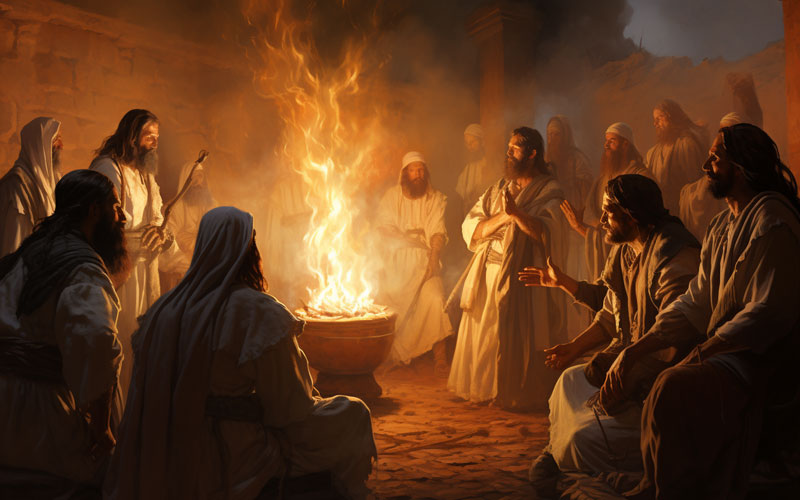Does Certainty Destroy Faith?

In the tumultuous seas of life, we cling to certainty as our life raft. After all, who wouldn't crave the comfort of an anchor in this often chaotic world? The more we know, the less we fear, right? The truth is, certainty can sometimes be a double-edged sword, particularly when it comes to matters of faith.
Now, don't get me wrong. I'm not about to suggest you toss your umbrella just because it's not raining this second. But let's dive a bit deeper, shall we? Imagine you're holding a map of a city you've never visited. The certainty of the map provides comfort, yes. But wouldn't the thrill of discovery, the joy of surprise, and the lessons learned from wrong turns be stifled if you were to solely depend on the map? Let's explore this concept through a spiritual lens.
The Bible tells us that "faith is the substance of things hoped for, the evidence of things not seen" (Hebrews 11:1). It's an understanding that there's a divine plan, even when our circumstances seem utterly devoid of one. The need for faith arises from the very limitations of our human nature. We cannot see the full tapestry of God's work, so we must trust in His wisdom.
Doubt, on the other hand, is often vilified. We equate it with a lack of faith, yet doubt is actually a necessary step in our spiritual growth. Like Thomas, who needed to see the wounds of Jesus to believe (John 20:24-29), our doubts can lead us to seek truth and strengthen our faith. Doubt isn't the enemy of faith; complacency is.
A classic example can be found in the journey of the Israelites. They were led by a pillar of cloud by day and a pillar of fire by night - physical manifestations of God's guidance. Their faith wasn't put to the test in the same way ours is today, but they still needed trust and discipline to follow God's directives, often without knowing why.
This brings us to the crux of our discussion: certainty versus faith. They may seem like two sides of the same coin, but they have profound differences. Certainty leaves no room for growth or exploration. It’s like reading a book with the ending already revealed; the story loses its grip, the suspense is extinguished. In contrast, faith invites exploration, questions, and growth.
Additionally, certainty in God's plan could lead to an overdependence on predestination and a disregard for personal responsibility. The Parable of the Talents (Matthew 25:14-30) is a brilliant illustration of this. If the servants knew with certainty the master's plan, they might have been tempted to sit idle, relying solely on the master's return. But it was their faith in their master, coupled with their diligent work, that brought about increase.
Not having certainty in God's plan doesn't imply a lack of trust in His goodness. On the contrary, it invites us to foster an unwavering faith in His promises, a resolute belief in His wisdom, and a steadfast hope in His love. It encourages us to lean not on our understanding, but to trust in Him with all our hearts (Proverbs 3:5-6).
In the grand scheme of God's master plan, we may be navigating blind, but we're certainly not navigating alone. Our lack of certainty in His plan is an open invitation to deepen our faith, to 'walk by faith, not by sight' (2 Corinthians 5:7).
While certainty may offer comfort in the stormy seas of life, it can silently act as an adversary to faith. To unpack this seemingly paradoxical idea, let's take a quick detour down memory lane.
As a teenager, I was absolutely certain that my favourite band – 'The Rocking Theologians' (don't laugh) – was the best in the world. That blind certainty left no room for exploring other genres of music. Similarly, when we confine ourselves to the boundaries of certainty in our spiritual journey, we unintentionally stunt our growth.
But how, you may ask, can certainty erode faith?
Firstly, certainty fosters complacency. It's human nature to seek comfort zones. When we think we have all the answers, we stop asking questions. We retreat into our shells of certainty, inhibiting the growth of our faith. Remember the Parable of the Sower? The seeds that fell on good soil bore fruit because they were nurtured, not because they were certain (Matthew 13:1-23).
Secondly, certainty closes the door to new perspectives. The Bible is a treasure trove of wisdom, a tapestry woven with complex, multi-layered narratives. When we approach it with an attitude of 'been there, done that', we miss out on fresh insights. The Pharisees were certain they knew the law, yet they missed the coming of Christ, the fulfilment of the law they prided themselves on knowing (John 5:39-40).
Thirdly, certainty can lead to self-reliance, pushing us away from depending on God. When the Israelites saw the Egyptians approaching them at the Red Sea, their certainty of impending doom almost robbed them of one of the most spectacular miracles in history (Exodus 14:10-31). It was when they discarded their certainty and trusted in God that they were delivered.
Certainty, though comforting, can sometimes act as a spiritual fog, obscuring our path to deeper faith. It may give us a sense of control, but let's not forget that our journey with God isn't a well-trodden path; it's a faith-fuelled adventure filled with trials, lessons, and blessings.
In short, certainty doesn't inherently destroy faith. However, an overreliance on certainty can inadvertently limit our spiritual growth and impede our journey to deeper faith. So, let's temper our certainty with a hearty dose of faith, humility, and curiosity. After all, we're explorers in the vast expanse of God's wisdom, not merely tourists snapping pictures from a safe distance.
In our quest for certainty, we may be confusing it with confidence or conviction. The confident swimmer is not certain that they won't encounter a riptide, but they have faith in their ability to navigate it. Conviction is the firm belief we hold, often without empirical evidence. It's this faith, this conviction, that fuels the resilience of the human spirit, not certainty.
Jesus, the cornerstone of our faith, provides a fascinating perspective. Did Jesus have faith? Certainly, for He regularly prayed to His Father, seeking guidance and strength. He wasn't merely certain of His divine nature; He had faith in His Father's plan. His was a perfect balance of faith and certainty that we strive to emulate.
We crave certainty because it shields us from the discomfort of the unknown. It soothes our fears, appeases our anxiety, and provides us with a false sense of control. But it’s in the unknown, in the realm of faith, that we truly grow.
The apostle Peter paints a vivid picture of this dichotomy. When he stepped out of the boat to walk towards Jesus, he wasn't certain he wouldn't sink. He took a leap of faith. And even when he did begin to sink, his faith led him to call out to Jesus, resulting in a miraculous rescue (Matthew 14:28-31).
As we delve further into our discussion on faith and certainty, we encounter a challenging question: if certainty relies on empirical evidence, how can we be certain of God's existence? This, dear reader, is where faith takes centre stage.
First, let's clarify what empirical evidence entails. It refers to information acquired through observation or experimentation — evidence that can be physically tested and verified. Yet, many of life's profound experiences elude this empirical framework. How do you empirically measure love, or quantify the depth of sorrow? These aspects of our human experience, though intangible, are no less real.
Similarly, our relationship with God often transcends empirical validation. It's an intimate bond nurtured through prayer, scripture, and personal experiences. However, just because it doesn't fit neatly within the parameters of empirical evidence, doesn't make it any less valid or meaningful.
The Bible recounts numerous instances where individuals experienced God in deeply personal ways. Take Moses at the burning bush (Exodus 3:1-15), or Paul on the road to Damascus (Acts 9:1-19). These encounters with the divine weren't empirically verifiable, yet they were profoundly transformational.
Doubt may naturally arise in the absence of empirical evidence. Yet, it is in this very space of uncertainty that faith blossoms. The renowned theologian, Paul Tillich, said it best: "Doubt isn't the opposite of faith; it is an element of faith."
To say we're certain of God's existence might imply we've unravelled the entirety of the divine mystery, reducing God to an empirical concept. But the Bible reminds us that God is beyond our comprehension. As Job stated after his trials, "I know that you can do all things; no purpose of yours can be thwarted. [...] Surely I spoke of things I did not understand, things too wonderful for me to know" (Job 42:2-3).
So, where does this leave us? In an exciting realm of faith, I'd argue. It's the space where we choose to believe, even without empirical evidence. It's where we decide to trust in God's promises, even without seeing the full picture. It's the journey from merely seeing to truly perceiving, from knowledge to wisdom, from certainty to faith.
To sum it up, while empirical evidence forms the bedrock of certainty, faith thrives in the soil of uncertainty. It's in this landscape of unknowns that we stretch our spiritual muscles, explore the complexities of our beliefs, and, ultimately, grow closer to God. After all, the essence of faith lies not in seeing and believing, but in believing even when we cannot see.
Faith and certainty are not enemies, but they do thrive in different environments. Certainty anchors us in the comfortable confines of our knowledge, while faith pushes us to seek, grow, and depend on God's guidance. While there's comfort in certainty, the true adventure lies in faith.
In our quest for spiritual growth, let's not be afraid of doubt, nor should we cling too tightly to certainty. Instead, let's welcome faith as our guide, as we navigate the uncharted territories of our spiritual journey. Because, my dear reader, it's in the journey, not the destination, where the beauty of faith truly lies.


